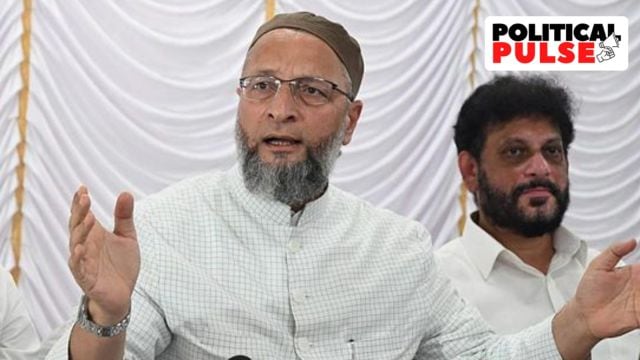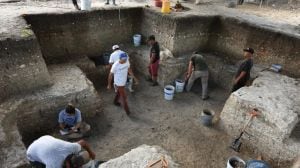Riots, demography in mind, smaller parties focus on North-East Delhi
AIMIM is planning debut, BSP and JD(U) are retrying luck in the area comprising 10 Assembly segments, of which the AAP won seven and BJP three last time.
 All India Majlis-e-Ittehadul Muslimeen (AIMIM) president and Lok Sabha MP from Hyderabad, Asaduddin Owaisi (Express file photo)
All India Majlis-e-Ittehadul Muslimeen (AIMIM) president and Lok Sabha MP from Hyderabad, Asaduddin Owaisi (Express file photo)MARKED by the riots of 2020, and by its diverse demography, comprising significant Purvanchali, Muslim, Dalit and OBC populations, North-East Delhi is seeing a rash of regional outfits like the Asaduddin Owaisi-led AIMIM, Mayawati’s Bahujan Samaj Party (BSP) and Nitish Kumar’s JD(U) try their luck for the coming Assembly polls.
The AIMIM, which will make its debut in the Delhi Assembly elections, has fielded former Aam Aadmi Party (AAP) councillor Tahir Hussain from the Mustafabad seat, which falls under North-East Delhi and was affected by the riots.
The party’s Delhi unit chief, Shoaib Jamai, said the AIMIM is planning to contest 10-12 seats in the Capital where Muslim population holds significant sway. But while that includes areas like Seelampur, Okhla, Babarpur and Chandni Chowk, North-East Delhi continues to be its primary focus.
“Discussions are on regarding multiple constituencies. We will likely field candidates from those seats where Muslims make up 30% of the electorate, but those seats where the community makes 25% of the votes are also under consideration. However, our prime focus is on areas in North-East Delhi and our second list is likely to be released in the next few days,” he told The Indian Express.
While Muslims make up around 57% and 52% of the votes in Seelampur and Okhla respectively, the community comprises 41% and 39.5% of the votes in Babarpur and Mustafabad. The community makes up 30% of the voters in Chandni Chowk and 23.5% of voters in Seemapuri.
The AIMIM’s move to nominate Hussain, who was expelled from the AAP after being named as an accused in the 2020 riots, has triggered strong reactions from his former party, which claimed it could “benefit the BJP”. Jamai, however, defended the move and claimed it was a “symbolic gesture”. “The AAP nominated Naresh Yadav (he was later replaced by Mahender Chaudhary), who was convicted in a Quran desecration case but Tahir, who was only accused in the riots, was expelled from the party. This speaks a lot about the party. We will raise this ‘two-faced’ nature of the AAP during the campaign,” the Delhi AIMIM chief said.
Alluding to Owaisi’s “haqq and izzat (rights and respect)” comment during a recent rally at New Mustafabad, Jamai said the party’s campaign will revolve around it. “If we need to live with rights and dignity, we need our voice to be heard in the Assembly. We want cleanliness, drinking water and schools in Mustafabad and we will not get these until you use your votes properly. We cannot be reduced to those who just cast votes but we need to become those who garner votes as well,” Owaisi told the gathering.
The North-East Delhi Lok Sabha seat comprises 10 Assembly segments, of which the AAP won seven (Burari, Timarpur, Seelampur, Babarpur, Gokalpur, Seemapuri and Mustafabad) while three (Rohtas Nagar, Ghonda, Karawal Nagar) of the BJP’s eight seats came from the region. The Seemapuri seat is currently vacant as its MLA Rajendra Pal Gautam resigned and subsequently joined the Congress.
Unlike the AIMIM, the BSP has been contesting the Delhi Assembly polls since 1993 and fielded candidates in all 70 seats the past four times, and is planning to do so again. In 2008, the Mayawati-led outfit had won two seats – Badarpur and Gokalpur – with a vote share of around 14%. But since then, the BSP’s electoral fortunes have been on the decline with the party securing just 0.71% of the votes in the 2020 polls.
Nevertheless, in the 2015 polls, BSP candidates played spoilsport as they garnered more votes than the victory margins in 17 seats, four of them located in North-East Delhi, including Gokalpur.
The president of Delhi BSP, Lakshman Singh, said it was “too early” to announce candidates. “However, aspirants are currently being interviewed. Some fresh faces are also in the mix. One can say North-East Delhi is a focal point but we are going to fight elections with our full might,” he said.
Keeping the significant chunk of Purvanchali voters in mind, the Bihar-based JD(U) is keen on throwing its hat in the ring and has accused the AAP of not doing enough for Purvanchalis during the Covid pandemic, the issue around which it is expected to build its campaign.
“We are having talks (over seat-sharing) with the BJP and a decision regarding this will be taken soon. While we are hopeful of getting seats like Palam and Badarpur too, our focus will be on North-East Delhi,” JD(U) working president Sanjay Jha told The Indian Express.
In 2020, the party had contested from Sangam Vihar and Burari, both with a significant Purvanchali voter base, and secured a substantial 28% and 23% of the votes, respectively.






- 01
- 02
- 03
- 04
- 05

























